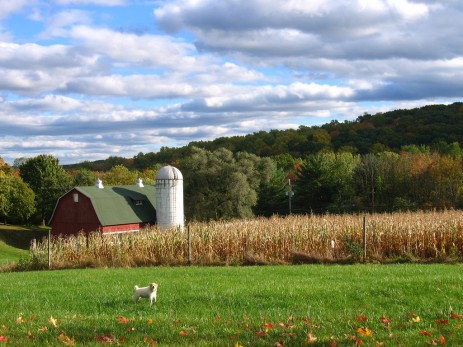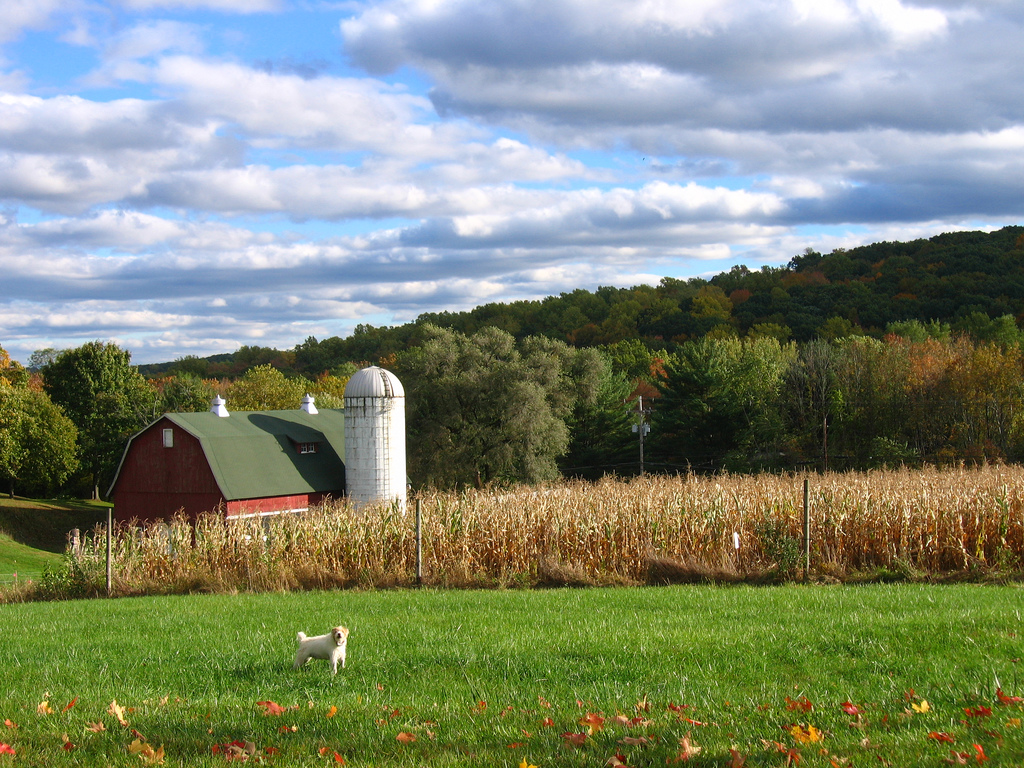 Photo: Dog CompanyThe climate and energy legislation that the House passed in June would increase revenues for farmers, according to a preliminary analysis released by the United States Department of Agriculture on Wednesday.
Photo: Dog CompanyThe climate and energy legislation that the House passed in June would increase revenues for farmers, according to a preliminary analysis released by the United States Department of Agriculture on Wednesday.
The study contradicts claims from some major agriculture groups that the bill would be economically catastrophic for farmers. Instead, the study predicts that farmers and foresters would benefit directly both from pollution-permit revenues allocated to the sector and from selling offsets to polluters.
The report estimates that from the allocation of pollution permits, farmers will bring in an additional $75 million to $100 million each year from 2012 to 2016. And the offsets market created by the bill has the potential to generate income of $1 billion for the farm sector each year between 2015 and 2020, and $15 billion to $20 billion annually from 2040 to 2050.
“In the short term, the economic benefits to agriculture from cap-and-trade legislation will likely outweigh the costs,” USDA head Tom Vilsack told the Senate Agriculture Committee on Wednesday. “In the long term, the economic benefits from offsets markets easily trump increased input costs from cap-and-trade legislation.” The benefits of climate legislation, he said, “can outpace, perhaps significantly outpace, the costs.”
The study, which evaluates potential impacts on the ag sector in the short, medium, and long term, predicts higher costs for inputs and energy. But it also highlights the potential for significant income growth for farmers. And Vilsack said the estimates for economic growth are conservative, as the study, in its own words, “assumes no technological change, no alteration of inputs in agriculture, and no increase in demand for bioenergy as a result of higher energy prices.”
“It’s quite possible that farmers will actually do even better than we predict,” Vilsack said at the Senate hearing. “Farmers are innovators. One of the reasons they have been successful is they have been adapters.”
Vilsack went toe-to-toe with some ag-state members of the committee who repeated claims that the climate bill would be detrimental to U.S. farmers. After Pat Roberts (R-Kan.) suggested as much, Vilsack countered, “I guess I approach this from a slightly different viewpoint on the capacity of agriculture to innovate.”
Vilsack also noted that farmers are well-positioned to become providers of cellulosic ethanol and other biofuels derived from plants and manure, and that such endeavors could create new jobs in rural communities. Those sorts of positive impacts are difficult to account for in an economic analysis, he said.
“This is a new world here,” Vilsack told reporters after the Senate hearing. “And how in the past have farmers reacted to a new world? They have embraced it, they have utilized technology, and they have become the most productive farmers in the world. Why are we going to stop?”
Agricultural groups and farm-state legislators have been divided over the climate bill. The House bill includes significant concessions to the industry, granted at the behest of House Agriculture Committee Chair Collin Peterson. The American Farmland Trust, the National Association of Wheat Growers, and the National Farmers Union back the bill.
But some ag-state reps weren’t won over by Peterson’s efforts, and many major agricultural groups opposed final passage of the bill, including the American Farm Bureau Federation, American Farmers and Ranchers, the National Chicken Council, the National Corn Growers Association, the National Council of Farm Cooperatives, the National Pork Producers Council, and the National Turkey Federation.
The Ag Committee also heard testimony from John Holdren, director of the White House Office of Science and Technology Policy, who outlined potential threats to agriculture should global warming continue unfettered, including increased drought and pestilence and decreased productivity. To prevent that, said Holdren, “every effort should be made” to prevent the global average temperature from rising more than 2 degrees Celsius.
Holdren also teed off on senators skeptical of cap-and-trade, the administration’s favored approach to addressing climate change. After Sen. Ben Nelson (D-Neb.) suggested that they could put a cap on emissions but not create a trading market for carbon credits, Holdren bluntly pointed out that the entire point of a cap-and-trade plan is to allow businesses to “find the most economical way to achieve the emissions reductions.”
Agriculture Committee Chair Tom Harkin (D-Iowa), who in the past has expressed pessimism about the chances of passing a bill this year, affirmed at the hearing that his panel understands the need to act and will be willing participants in crafting legislation. President Obama, he noted, wants legislation in place before world leaders meet to hash out a new climate treaty in Copenhagen in December. “We will do our darnedest to try to meet that deadline,” said Harkin.



